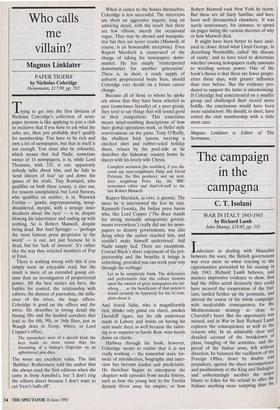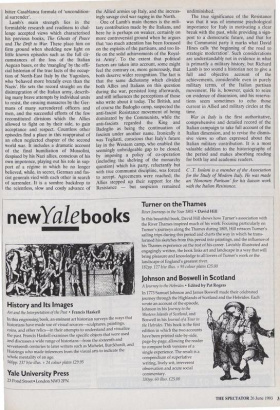The campaign
in the campagn a
C. T. Isolani
WAR IN ITALY 1943-1945 by Richard Lamb John Murray, £19.95, pp. 335 Indecisive in dealing with Mussolini between the wars, the British government was even more so when reacting to the opportunities presented by his ousting in July 1943. Richard Lamb believes, and musters impressive evidence to show, that had the Allies acted decisively they could have secured the cooperation of the Ital- ians, landed further up the peninsula, and altered the course of the whole campaign, with incalculable consequences for the Mediterranean strategy so close to Churchill's heart. But the opportunity was missed, and in War in Italy Richard Lamb explores the consequences as well as the reasons why. In an admirably clear and detailed account of the breakdown of plans, bungling of the armistice, and dis- persal of the Italian army, left without direction, he balances the vacillation of the Foreign Office, beset by doubts and prejudices, against the sheer incompetence and pusillanimity of the King and Badogho, and unhesitatingly ascribes the major blame to Eden for his refusal to offer the Italians anything more tempting than the
bitter Casablanca formula of 'uncondition- al surrender'.
Lamb's main strength lies in the formidable research and readiness to chal- lenge accepted views which characterised his previous books, The Ghosts of Peace and The Drift to War. These place him on firm ground when shedding new light on little known episodes such as the full cir- cumstances of the loss of the Italian Aegean bases, or the 'mangling' by the offi- cial historian of the true facts of the occup- tion of North-East Italy by the Yugoslays, who 'behaved more brutally even than the Nazis'. He sets the record straight on the disintegration of the Italian army, describ- ing many brave attempts by individual units to resist, the ensuing massacres by the Ger- mans of many surrendered officers and men, and the successful efforts of the few reconstituted divisions which the Allies allowed to fight on by their side, to gain acceptance and respect. Countless other episodes find a place in this reappraisal of an often neglected chapter of the second world war. It includes a dramatic account of the final humiliation of Mussolini, despised by his Nazi allies, conscious of his own impotence, playing out his role in sup- port of a regime in which he no longer believed, while, in secret, German and fas- cist generals vied with each other in search of surrender. It is a sombre backdrop to the relentless, slow and costly advance of the Allied armies up Italy, and the increas- ingly savage civil war raging in the North.
One of Lamb's main themes is the mili- tary contribution made by the Italians, and here he is perhaps on weaker, certainly on more controversial ground when he argues that `too much attention has been focussed on the exploits of the partisans, and too lit- tle on the solid achievements of the Royal- ist Army'. To the extent that political factors are taken into account, some might feel the contrary or, more generously, that both deserve wider recognition. The fact is that the same dichotomy which divided both Allies and Italians on this question during the war, persisted long afterwards, and still influences the perceptions of those who write about it today. The British, and of course the Badoglio camp, suspected the anti-fascist Resistance movement of being dominated by the Communists, while the anti-fascists regarded the king and Badoglio as being the continuation of fascism under another name. Ironically it was Togliatti, conscious that Italy's future lay in the Western camp, who enabled the seemingly unbridgeable gap to be closed, by imposing a policy of co-operation (including the shelving of the monarchy question) which his party, reluctantly but with true communist discipline, was forced to accept. Agreements were reached; the Allies stepped up their support for the Resistance — but suspicion remained
undiminished.
The true significance of the Resistance was that it was of immense psychological importance for Italy in motivating a clear break with the past, while providing a sign- post to a democratic future, and that for the Communist party it marks what David Hines calls 'the beginning of the road to strategic moderation'. Such considerations are understandably not in evidence in what is primarily a military history, but Richard Lamb is too sound a historian not to give a full and objective account of the achievements, considerable even in purely military terms, of the Italian partisan movement. He is, however, quick to seize on evidence of dissension, and his reserva- tions seem sometimes to echo those current in Allied and military circles at the time.
War in Italy is the first authoritative, comprehensive and detailed record of the Italian campaign to take full account of the Italian dimension, and to revise the dismis- sive views so often expressed about the Italian military contribution. It is a most valuable addition to the historiography of the period and makes absorbing reading for both lay and academic readers.
C . T Isolani is a member of the Association for the Study of Modem Italy. He was made an 'Honorary Partisan' for his liaison work with the Italian Resistance.



























































 Previous page
Previous page